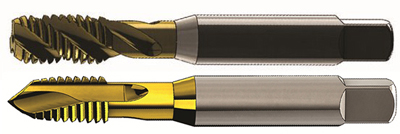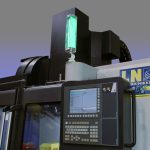Spiralock Thread Form Taps
Spiralock Thread Form Taps
Machinists can now add a locking feature to tapped holes by utilizing specialized Spiralock taps from Stanley Engineered Fastening optimized for extended tool life in high volume CNC operations.

Machinists can now add a locking feature to tapped holes by utilizing specialized Spiralock taps from Stanley Engineered Fastening optimized for extended tool life in high volume CNC operations. These taps, the next generation of a popular tool set re-designed to meet the needs of high speed production shops, are based on a unique thread form that resolves the thread loosening and joint integrity problems common to standard fasteners.
For more than 35 years, the Spiralock thread form has been used in extreme fastening applications where joint failure or loosening is not an option: from the main engines of NASA's Space Shuttle, the Saturn Cassini orbiter and Titan Huygens probe to deep sea oil rigs, military and aerospace vehicles, as well as medical implants, artificial limbs, and heart pumps.
The Spiralock thread form solves thread loosening and joint integrity issues by changing the physics of how the threads interact. In traditional 60-degree threads, the gap between the upper edges of the male and female threads can lead to vibration-caused thread loosening. Stress concentration and fatigue at the first few engaged threads is also a problem, particularly with softer metals. The unique profile of Spiralock threads closes the gap that causes loosening, improving the integrity and reliability of threaded joints.
Thread form tapping has traditionally been a relatively slow machining operation, due to its limited visibility and necessary precision. Not content to let tapping technology become stale, Stanley Engineered Fastening, owner of the Spiralock brand and global provider of innovative fastening and assembly technologies, has reimagined tapping with the thread form for higher performance and increased off-the-shelf availability.
"Compared to other machining operations, thread form tapping has been relatively slow," says Jeff Jungmann, a Spiralock engineering manager. "The entire cut has to be made in one pass with little to no visibility, so most machinists are very conservative about their speeds."
Shortly after it acquired the company, Stanley Engineered Fastening decided to re-boot the Spiralock product line to enable high-speed, CNC production and extend tool life. They also streamlined the number of tap choices so they are now immediately available in stock.
"These machine taps have been improved for CNC machining in regards to the tool's geometry, surface coatings, flute angles as well as shapes, nose size and other key factors," says Jungmann. "This not only enables high speed production but also significantly extends the tool's life."
The new thread form taps include four styles: Multi-Purpose, T-10 Straight Flute, Cold Forming, and High Performance, of which all but the Cold Forming include a physical vapor deposition (PVD) coating for a harder, more lubricious, wear-resistant surface than typical taps finished with nitride or a bright finish.
To enable machine tapping with the thread form and prolong wear life, tap blanks include a neck behind the threads on most sizes. The neck allows more room for coolant to get into the hole being tapped, and more room for chips to get cleared away from outside a blind hole. This decreases heat buildup and further increases wear life.
The PVD coatings enable tapping up to 50 percent faster than previous nitride or bright finished taps, and helps the tap to cut smoothly in deeper holes where there is little coolant or lubrication. For faster tapping in difficult materials, such as nickel alloys and super alloys, the High Performance taps add a dual layer PVD coating, using a super low-friction topcoat over a hard, heat-resistant base layer.
To reduce complexity and enable in-stock availability, the four tap styles are offered in plug chamfer for through holes or a bottom chamfer for bottom holes. Minor changes to flute shape have also improved tap usability across a broader range of materials for each style. For instance, hook, rake, and spiral point angles are tailored to specific purposes corresponding to each tap style.
Every geometry change was made with the goal of increasing tool life. Since the point diameter at the front of all tap styles is now larger, the taps start cutting material sooner and spread the load more evenly over all the cutting edges, improving wear life.
"By improving the quality of the tapping tool, machinists can now have the confidence they are making the proper cut without having to be as conservative in their speeds," says Jungmann. "This allows them to use the Spiralock thread form while running at higher production speeds, reducing cycle time."





